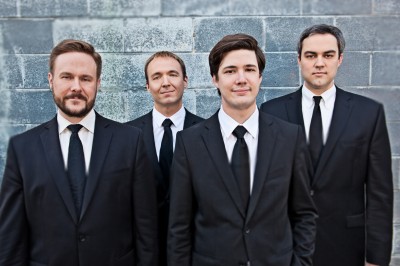
Choral music (and a quartet) for a sacred time
The Western world grows more secular every day, but the rhythms of our concert season are still linked to large religious observances, with things generally wrapping up in early spring with the arrival of Passover and Easter.
Two choral concerts this week are firmly in sacred Christian territory, and the Master Chorale of South Florida will close its current season in a couple weeks with a mass by Schubert and religious works by Mozart and Mendelssohn. There’s something about our society’s need for ceremony and ritual that makes musical events like this so prevalent when April rolls around.
Florida International University: The college’s Concert Choir, Women’s Chorus and its Master and University Chorales all combine tonight for music by Benjamin Britten and Maurice Duruflé, two 20th-century masters. The Britten is his Festival Te Deum, written in the 1940s for the centenary of a church in the London suburb of Swindon. This relatively brief work covers a lot of compositional ground from meditative to dramatic, and like much of Britten’s choral output, it is too little-known by the general public (choral directors and singers are another story).
The Duruflé is his Requiem, probably his most popular work, and one that follows more in the quiet line of his great compatriot Gabriel Fauré than the heaven-storming drama of Berlioz or Verdi. But that’s not to say it has no energetic music; it is a sensitive, intelligent reading of this ancient text, and Duruflé draws a wealth of beauty from his voices and the organ, of which he was one of the leading French masters. The music often has a timeless but modern quality, particularly in the Sanctus, that seems well-suited for an interplanetary concert in the 22nd century, if that makes any sense.
The concert is set for 7:30 p.m. today in the concert hall of the Wertheim Performing Arts Center on the FIU campus. Tickets are $15; call 305-348-0496 or visit the university’s website.
Seraphic Fire/Spektral Quartet: String quartets are a hot commodity these days, the classical music world’s equivalent of a tight rock band. One of the hottest young quartets in the city of Chicago (which has a wonderful music scene) is the Spektral Quartet, which a couple weeks ago debuted The Ringtone Project, in which the quartet commissioned 40-plus composers to write very tiny pieces that could be used on mobile devices (they’re available at the quartet’s website at spektralquartet.com).
This is the kind of innovation that classical music is exploring more of these days, and beginning tonight, the quartet takes part in another hybrid performance when it joins the Seraphic Fire choir for five performances here, and two in the Midwest, of Franz Joseph Haydn’s The Seven Last Words of Our Savior on the Cross, to give it its full title.
Originally written in 1785 as a series of orchestral meditations on seven statements, rather than words, spoken by Christ in his crucifixion agony, Haydn rewrote the Seven Last Words for chorus after hearing an arrangement of it done that way in a town near Vienna. He also reworked it for piano solo and for string quartet, capitalizing on its enormous popularity with the audiences of the day.
Seraphic Fire will sing the choral version accompanied by the string quartet version, which is an unusual marriage but which should work admirably. It’s a somber but deeply moving piece, and Haydn lives up to his reputation for compositional surprise at the end of the piece with his powerful depiction of the earthquake that followed Christ’s expiry.
The two groups will perform this work at St. Sophia Greek Cathedral in Miami tonight at 7:30, followed by performances in Boca Raton, Coral Gables, Fort Lauderdale and Miami Beach. On April 16, it will be performed again at Rockefeller Memorial Chapel at the University of Chicago, and two days later a little north of there in the Lawrence Memorial Chapel on the campus of Lawrence University in Appleton, Wis.
Tickets are available through seraphicfire.org, or by calling 305-285-9060.
Recent Content
-
Artsarticle ·
-
Artsarticle ·
-
Artsarticle ·
